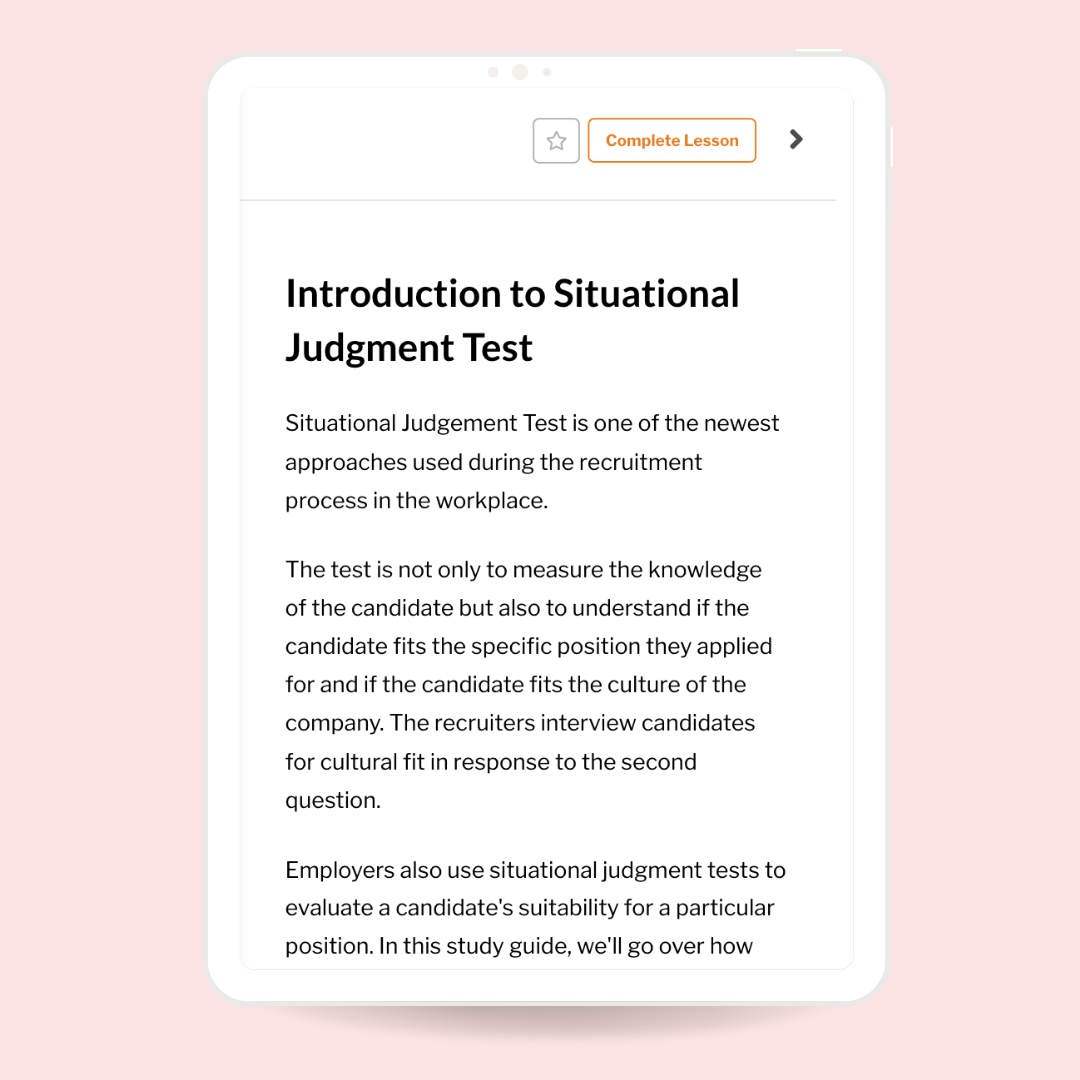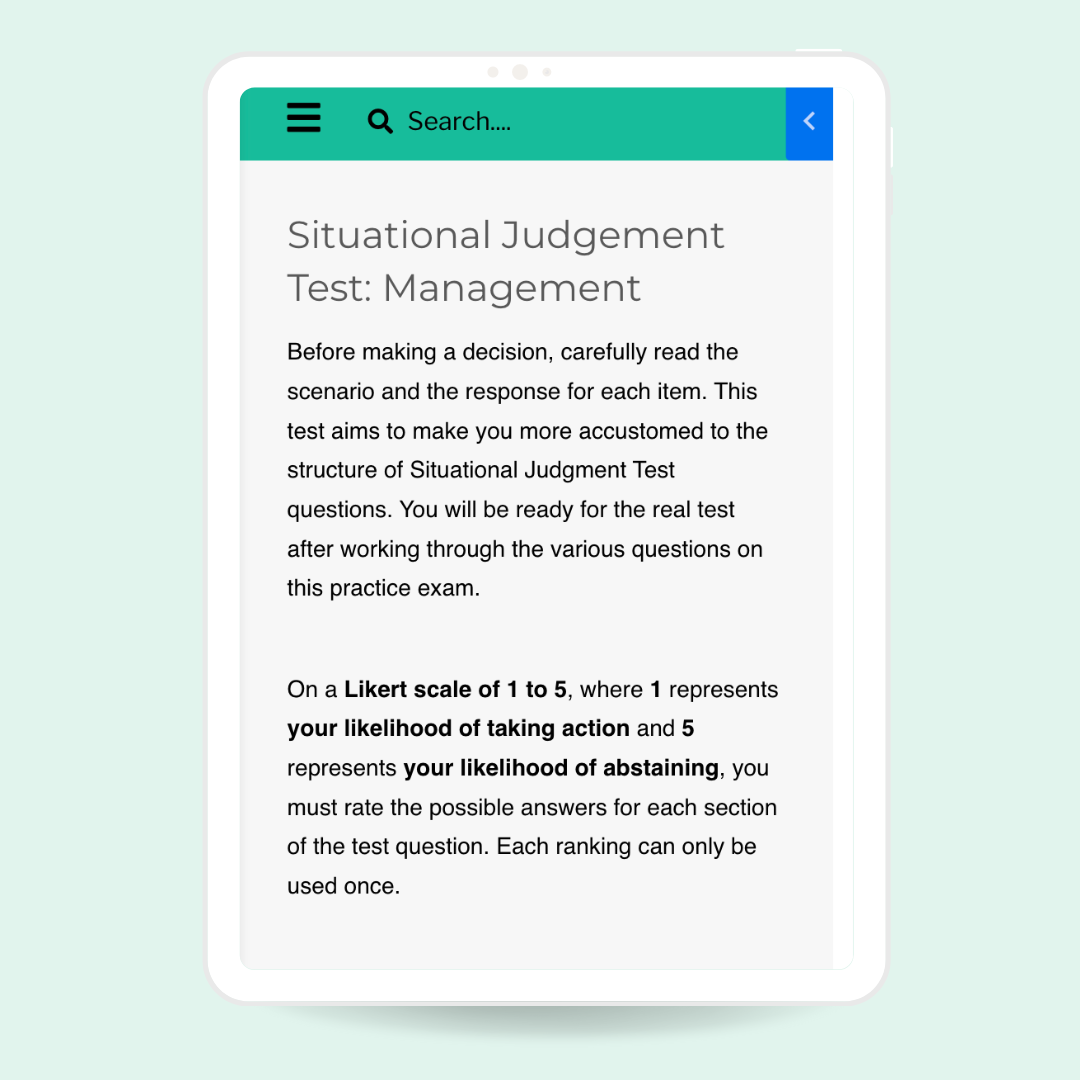Succeed in Situational Judgment Testing with Our Authentic Prep (2025 Updated)
Get access to the Situational Judgment Tests and increase your chances of success in with our tailored practice aptitude tests package, and get the job you have always wanted.
Get Started NowGet Prepared For Leading Employers' Tests

Instant Access
Access Interactive Tests
- SJT practice test package, developed by professionals in the field
- Real-life scenarios and situations > A large bank of practice questions to help you increase your test score.
- A full package of SJT practice test questions


Practice
Improve Your Score Fast
In the Situational Judgment Tests practice package, you will find a range of tools to help you learn as quickly and easily as possible.
- Detailed guides > With detailed explanations
- Useful tips > Find useful step-by-step tips to help you pass each question
Secure Your Dream Job
Our tests are targeted to help you to get the job you want.
- Real-time simulations > Practice our timed tests which are designed to simulate the real test experience you'll face
- Response evaluation > Learn how each scenario's candidate responses are analysed and contrasted against a predetermined set of standards
- Summary report > Get access to a summary report that lists the candidate's strengths and weaknesses in handling pressure-filled work environments

What are Situational Judgment Tests (SJT)?
-
The Situational Judgment Test (SJT) is a type of pre-employment assessment that employers use to assess a candidate's ability to make judgement calls and solve problems in the context of actual work situations.
-
The test typically consists of a series of hypothetical situations that one might run into on the job, along with a number of potential responses, and the candidate must select the most appropriate response.
-
Following that, the responses are assessed to ascertain the candidate's decision-making skills, situational awareness, and capacity for navigating difficult and complex situations.
Why Situational Judgment Test?
-
Situational judgment tests (SJTs) are a tool used by employers to assess how candidates might react in the event of a real-life scenario that might arise at work.
-
SJTs shed light on a candidate's ability to solve problems, make decisions, and manage their emotions.
-
Employers can assess whether a candidate is a good fit for the company's culture and values by looking at how they respond to hypothetical scenarios. This helps them better understand how the candidate might handle similar situations in the workplace.
Which Employers Use Situational Judgment Test?
- Companies from different industries and from different parts of the world use situational judgment tests during their recruitment process.
- These companies include Jaguar Land Rover, NHS, Ernest & Young, KPMG, HSBC, PwC, Deloitte, GlaxoSmithKline (GSK), Civil Service Fast Stream, and many others.
Situational Judgment Test Sample Questions
Join Thousands of Successful Customers Who Passed Their Tests
How to Prepare and Pass Your Situational Judgment Test
If you don’t know how to prepare and pass your mechanical reasoning tests, these tips may be helpful for you:
- Carefully read the scenario: Before selecting a response, be sure to read and comprehend each scenario completely. Think about the situation and the characters' underlying motives.
- Consider the company's values: When making your decision, take into account how your response fits with the values and culture of the business.
- Put ethics first: Prioritise responses that are reasonable, truthful, and show integrity because ethical considerations are frequently significant in SJTs.
- Think about potential outcomes: Before selecting a course of action, consider the possible outcomes of each response. Take into account how your response will affect each of the parties.
- Practice, practice, practice: By taking practice tests, you can become familiar with the format of SJTs. As a result, you will feel more confident on test day and will have a strategy for how to approach each scenario.
- Keep your cool and stay focused: SJTs can be stressful, so try to maintain your composure and concentration throughout the exam. Take your time and carefully consider each response before moving on to the next scenario.
Practice Situational Judgment Test Anywhere, Anytime
Get quick access to our customised Situational judgment test and practice anywhere, anytime, even if you just have a few minutes to spare. You can resume where you left off with our user-friendly test practice system.
Get Started Now


